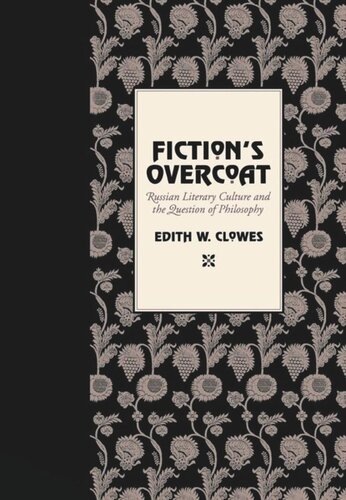

Most ebook files are in PDF format, so you can easily read them using various software such as Foxit Reader or directly on the Google Chrome browser.
Some ebook files are released by publishers in other formats such as .awz, .mobi, .epub, .fb2, etc. You may need to install specific software to read these formats on mobile/PC, such as Calibre.
Please read the tutorial at this link: https://ebookbell.com/faq
We offer FREE conversion to the popular formats you request; however, this may take some time. Therefore, right after payment, please email us, and we will try to provide the service as quickly as possible.
For some exceptional file formats or broken links (if any), please refrain from opening any disputes. Instead, email us first, and we will try to assist within a maximum of 6 hours.
EbookBell Team

0.0
0 reviewsIf Dostoevsky claimed that all Russian writers of his day "came out from Gogol's 'Overcoat,'" then Edith W. Clowes boldly expands his dramatic image to describe the emergence of Russian philosophy out from under the "overcoat" of Russian literature. In Fiction's Overcoat, Clowes responds to the view, commonly held by Western European and North American thinkers, that Russian culture has no philosophical tradition. If that is true, she asks, why do readers everywhere turn to the classics of Russian literature, at least in part because Russian writers so famously engage universal questions, because they are so "philosophical"? Her answer to this question is a lively and comprehensive volume that details the origins, submergence, and re-emergence of a rich and vital Russian philosophical tradition.During the late nineteenth and early twentieth centuries, Russian philosophy emerged in conversation with narrative fiction, radical journalism, and speculative theology, developing a distinct cultural discourse with its own claim to authority and truth. Leading Russian thinkers—Berdiaev, Losev, Rozanov, Shestov, and Solovyov—made philosophy the primary forum in which Russians debated metaphysical, aesthetic, and ethical questions as well as issues of individual and national identity. That debate was tragically truncated by the events of 1917 and the rise of the Soviet empire. Today, after seventy years of enforced silence, this particularly Russian philosophical culture has resurfaced. Fiction's Overcoat serves as a welcome guide to its complexities and nuances.Historians and cultural critics will find in Clowes's book the story of the increasing refinement and diversification of Russian cultural discourse, philosophers will find an alternative to the Western philosophical tradition, and students of literature will enjoy the opportunity to rethink the great Russian novelists—particularly Dostoevsky, Pasternak, and Platonov—as important voices in the process of shaping and sustaining a new philosophy and ensuring its survival into our own age.